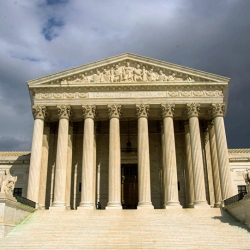
A narrow ruling would approve regulation-free sportsbooks, but most states might not allow such gaming.
Atlantic City casinos and Monmouth Park Racetrack in Oceanport are preparing for a US Supreme Court ruling on Murphy v. NCAA, the State of New Jersey’s challenge to the federal government’s 25-year old ban on sports betting in 46 states.
If New Jersey wins its case, it would bring up to $9 billion to the state’s gaming industry every year. Legal sports betting alone would generate more revenue than lottery betting, which generates $3 billion. Atlantic City’s casino industry generated $2.8 billion last year.
Retired State Sen. Ray Lesniak, who spearheaded gambling industry legislation for 40 years, said of the potential landmark case, “This law will jump-start the casino and racing industries, and that will save thousands of jobs.”
Dennis Drazin, speaking on behalf of Monmouth Park, said he is confident New Jersey finally has a winner in the sports betting case. Drazin said, “I’m certain we will win the case.”
Murphy v. NCAA Supreme Court Case
Murphy v. NCAA — previously known as Christie v. NCAA — wound its way through US federal courts for the past 5 years. At each step along the way, New Jersey lost court decisions against a coalition of American sports associations, including the NFL, NBA, NHL, Major League Baseball, and the NCAA.
During its first round of losses, a minority opinion in the Third District Court of Appeals in Philadephia gave former New Jersey Gov. Chris Christie’s lawyers an idea for a successful challenge of the Professional and Amateur Sports Protection Act (PAPSA), a federal ban enacted in 1992 which went into effect a year later.
New Jersey SPorts Betting Law
The appellate judge wrote that New Jersey’s 2012 regulations which allowed Atlantic City casinos and New Jersey racetracks to operate sportsbooks were a direct challenge to the US federal government’s ban. Instead, the state should repeal its sports betting regulations and decline to enforce provisions of PASPA, if a racetrack like Monmouth Park decided to operate a sportsbook.
Dual Sovereignty: The Federal Sports Betting Ban
The suggestion was based on the dual sovereignty clauses of the US Constitution. Dual sovereignty applies to federal and state governments, which are seen as sharing sovereignty in the United States. What that means in practical terms is that a state’s law enforcement resources cannot be commandeered by the US federal government to enforce its laws. While New Jersey cannot challenge the PASPA directly, it also cannot be forced to expend its resources to enforce the PASPA ban on Monmouth Park.
After its first challenge to PASPA ended in a June 2014 with the US Supreme Court declining to hear its appeal of an earlier defeat, New Jersey’s legislature repealed the earlier pro-sports betting law and Gov. Christie gave his attorney general orders not to punish Monmouth Park.
Monmouth Park/William Hill Sportsbook
Armed with that knowledge, Monmouth Park partnered with William Hill USA in October 2014 to operate an unregulated sportsbook on the grounds of the Oceanport racetrack. The NFL, NBA, MLB, NHL, and NCAA promptly sued Monmouth Park and New Jersey to keep that sportsbook from opening and the case has been in litigation ever since.
Make no mistake: New Jersey has lost 3 more decisions based on its new interpretations of the law. US District Judge Michael Shipp in Trenton ruled in favor of the NCAA and pro leagues. The 3rd District Court of Appeal upheld Shipp’s ruling in appellate court, then upheld that 2-1 decision months later in an “en banc” ruling of 12 judges. When that ruling came back 10-2 against New Jersey, it seemed to be the end of the line.
US Supreme Court Hears PASPA Case
Chris Christie appealed the case to the Supreme Court. Since the SCOTUS declined to hear the 2014, most people assumed the justices would decline to do so again. But the Supreme Court agreed to a hearing on December 4, 2017. Famed constitutional lawyer Ted Olsen argued on behalf of New Jersey and the justices have been deliberating ever since.
Unlike previous cases, many legal and gaming experts believe New Jersey has reasons to be optimistic this time. Despite a 5-legal decision losing streak against the sports leagues, when the Supreme Court agrees to hear a case, over 90% of those cases have some effect on existing laws. If the 9 justices were not serious about the dual sovereignty claims, they would have rejected the appeal, as they do the vast bulk of cases appealed to the SCOTUS.
Also, governors and attorneys general from 20 US states signed an amicus brief written by the attorney general of West Virginia, which supports New Jersey’s case. As many as 18 states currently have 28 different bills either signed or proposed which would legalize sports betting in their land casinos or racetracks, if SCOTUS overturned PASPA. Of course, New Jersey has been down this road before and lost every time.
Regulation-Free Sports Betting?
Sports and gambling lawyer Daniel Wallach wrote in Forbes Online this week that a narrow ruling by the US Supreme Court would be a help to New Jersey, but might not help the other 20 states which signed West Virginia’s amicus brief.
New Jersey’s regulation-free approach foregoes any state government oversight of Monmouth Park’s or Atlantic City casino’s sportsbooks. Presumably, it would forego taxation of such gambling, to avoid official sanction. Legal sports gambling would be a boon to Atlantic City’s casinos and New Jersey racetracks, thus propping up the flagging New Jersey gambling industries.
Wallach points out that most US states who want legal sports betting (probably) would not accept that model. If so, then a narrow victory might leave New Jersey with legal sportsbooks, while New York, Pennsylvania, and Maryland decline to legalize sports betting under those conditions. Such a narrow ruling might be a best-case scenario for New Jersey.
